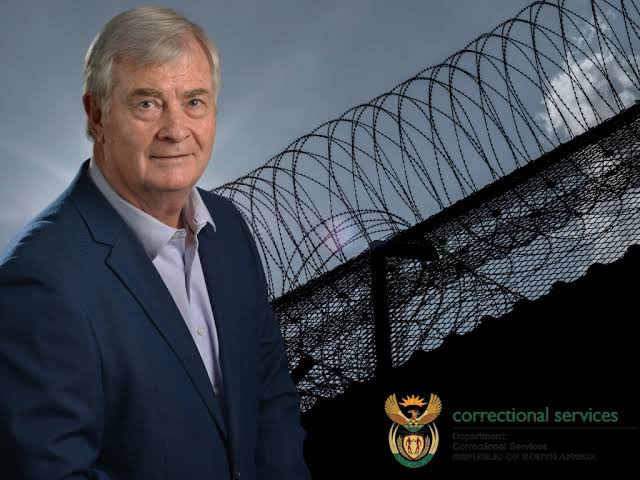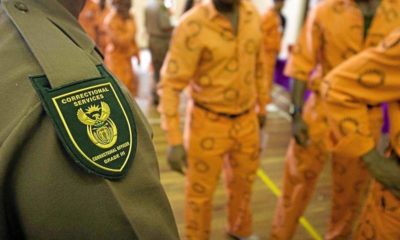News
‘Bring Back the Whip’: Minister’s Bold Bid to Ease Prison Overcrowding Sparks National Outcry

In a move that’s reignited decades-old debates about crime and punishment in South Africa, Correctional Services Minister Pieter Groenewald has suggested reintroducing corporal punishment to tackle overcrowding in the country’s prisons.
The proposal, made during his budget vote speech in Parliament, came with a grim diagnosis of a correctional system buckling under pressure, limited beds, growing gangs, and a justice system that’s become “a waiting room” for thousands who simply can’t afford bail.
Corporal Punishment: A Shocking Suggestion in 2025
Corporal punishment was officially abolished in South African prisons in 1996, when Parliament passed legislation aligning the criminal justice system with post-apartheid human rights values. Now, nearly 30 years later, Groenewald has reopened the wound, calling on lawmakers to debate whether the country should revive the practice , at least for minor offences.
“Imagine a young person who steals ten loaves of bread and ends up in prison for three years waiting for a sentence,” he argued in Afrikaans, alluding to remand detainees caught in legal limbo. “Shouldn’t we bring back corporal punishment?”
His remarks sparked murmurs in the National Assembly and outrage on social media, where many users slammed the idea as a regression to apartheid-era punishment and a violation of constitutional rights.
The Numbers Behind the Provocation
South Africa’s prisons currently house over 104,000 inmates, with only a limited number of beds. Of those, around 60,000 are awaiting trial, and a staggering 2,500 are behind bars simply because they can’t afford bail under R1,000. These aren’t hardened criminals. Some are in for petty theft, yet they remain locked up for years due to an overwhelmed system.
The minister painted a sobering picture of underfunded facilities plagued by gangsterism, decaying infrastructure, and critical staff shortages, a setting where rehabilitation becomes near impossible.
Death Penalty Enters the Chat
But Groenewald’s corporal punishment proposal wasn’t the most extreme idea voiced during the debate. That distinction went to Patriotic Alliance MP Marlon Daniels, who went a step further by calling for the reinstatement of the death penalty.
“Corporal punishment is mildly put. Bring back the death penalty,” Daniels said flatly. “You kill someone, be prepared to be killed.”
Daniels’ stance drew immediate backlash from human rights organisations and social commentators, who pointed to South Africa’s long and painful history with capital punishment, officially abolished by the Constitutional Court in 1995.
Budget Gaps and a Justice System in Crisis
Groenewald didn’t shy away from detailing the rot within his department. “I will not sugarcoat it,” he said. “We’re facing challenges ranging from overcrowding to crime syndicates inside our prisons.”
The minister outlined a three-year correctional services budget rising from R29.2 billion in 2025/26 to nearly R32 billion by 2027/28, but warned that budget cuts will derail key projects in skills development, parolee monitoring, and infrastructure repair.
“The system is cracking. We must be honest,” he told MPs.
A Dangerous Shortcut or a Call to Action?
Critics say Groenewald’s call for corporal punishment is a populist shortcut around deeper systemic failures, like the sluggish pace of court proceedings, underfunded legal aid, and failing rehabilitation strategies. But supporters argue he’s saying what many frustrated South Africans feel: the system is broken, and something drastic has to give.
“We have people sitting in prison longer than their sentences would be if convicted. That’s not justice,” a former prosecutor posted on X.
Others, including the Human Rights Commission, have warned that such proposals undermine constitutional protections and international commitments. South Africa is party to several treaties outlawing torture and degrading treatment, including corporal punishment.
Should the Debate Happen at All?
While Groenewald couched his comments as a call for debate, it’s unclear if government or the ruling ANC would ever allow a policy rollback that clashes so starkly with the Constitution’s values.
Nonetheless, the proposal has done what few budget speeches do: stir national conversation.
As poverty and crime continue to rise, and prisons continue to overflow, some South Africans are asking hard questions: How do we reform a justice system that punishes the poor and delays due process? And are we really prepared to sacrifice human rights for expedience?
One thing is clear, the criminal justice debate is far from over, and in an election-weary country, such populist provocations might find more traction than expected.
{Source: The Citizen}
Follow Joburg ETC on Facebook, Twitter , TikTok and Instagram
For more News in Johannesburg, visit joburgetc.com























